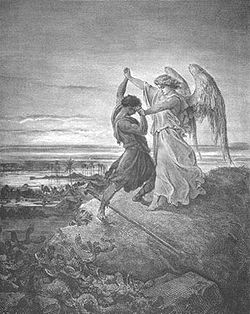
I wanted to respond just briefly to Michael Dolzani’s excellent “Necessary Angels” post. I have quoted the passage below in a previous post, and even though it appears in the closing paragraph of the second chapter of The Secular Scripture, a book devoted not to the Bible but to the romantic tradition, it still seems one of the most pertinent passages touching on the relationship between literature and otherness. Interestingly, Frye uses the image of the human struggle with an angelic dimension to describe this relationship, in which the mythological universe created by the human imagination is also an uncreated reality or revelation coming from elsewhere. Thanks to Sarah Tóth for the beautiful formulation of metaphor from Ricoeur, but surely the dialectic Frye points to here (and elsewhere) is just as balanced in its paradoxical formulation. Frye is contrasting the secular and the sacred scripture, the story of the creature and the story of the creator, and he casts back to his earlier evocation, in the same chapter, of none other than Wallace Stevens discussion of “imagination and reality” in The Necessary Angel:
Reality, we remember, is otherness, the sense of something not ourselves. We naturally think of the other as nature, or man’s actual environment, and in the divided world of work and ego-control it is nature. But for the imagination it is rather some kind of force of power or will that is not ourselves, an otherness of spirit. Not all of us will be satisfied with calling the central part of our mythological inheritance a revelation from God, and, though each chapter in this book closes on much the same cadence, I cannot claim to have found a more acceptable formulation. It is quite true that if there is no sense that the mythological universe is a human creation, man can never get free of servile anxieties and superstitions, never surpass himself, in Nietzsche’s phrase. But if there is no sense that it is also something uncreated, something coming from elsewhere, man remains a Narcissus staring at his own reflection, equally unable to suprass himself. Somehow or other, the created scripture and the revealed scripture, or whatever we call the latter, have to keep fighting each other like Jacob and the angel, and it is through the maintaining of this struggle, the suspension of belief between the spiritually real and the humanly imaginative, that our own mental evolution grows. Meanwhile we have on principle to go on with. The improbably, desiring, erotic, and violent world or romance reminds us that we are not awake when we have abolished the dream world: we are awake only when we have absorbed it again.
I love this baleful image of man as Narcissus, “staring at his own reflection” and unable “to surpass himself ” as long as he deprives himself of this sense of an otherness, of a revelation that transcends him even though it is also a human creation. The Narcissus image speaks volumes to the ultimate dilemma of so much of the criticism and theory of the last decades in its obsession with ideology and the incapacity of human beings ever to imagine anything that is not simply a shadow or projection of their own self-interested social constructions. God and the imagination are one, which is why we are really asleep when we have “abolished the dream world” of literature, and why we “are awake only when we have absorbed it again.”

Joe, I’ve been haunted by the point you make here for some time, and can only refer to my personal experience of what I take to be “kerygmatic” consciousness: is “otherness” ultimately an enhanced awareness of and concern for *others*?? Is the manifestation of the divine really just an expression of love?